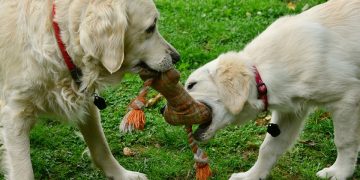Top Dog: Essential Tips for New Pet Parents
Welcoming a new furry friend into your home is an exciting and rewarding experience. Whether you’ve adopted a puppy or a senior dog, being a pet parent comes with a lot of responsibilities. From providing proper nutrition to training and grooming, there are many things to consider when it comes to caring for your new four-legged family member. In this guide, we’ll go over some essential tips for new pet parents to help you create a happy and healthy environment for your dog.
Choosing the Right Dog
Before bringing a new dog into your home, it’s important to consider factors such as the dog’s size, temperament, energy level, and grooming requirements. Research different breeds to find one that matches your lifestyle and living situation. If you’re adopting from a shelter, spend time with different dogs to see which one you connect with the most. Remember that each dog is unique, so it’s essential to choose a pet that fits well with your family.
Providing Proper Nutrition
Proper nutrition is key to keeping your dog healthy and happy. Make sure to feed your dog a balanced diet that meets their nutritional needs. Consult with your veterinarian to determine the best type of food for your dog based on their age, size, and activity level. Avoid feeding your dog table scraps or foods that are toxic to dogs, such as chocolate, grapes, and onions. Always provide fresh water for your dog and monitor their weight to prevent obesity.
Training and Socialization
Training is essential for teaching your dog basic commands and good behavior. Start with basic commands such as sit, stay, and come, and use positive reinforcement techniques such as treats and praise. Socialization is also important for helping your dog feel comfortable around people and other animals. Take your dog for walks, visits to the park, and enroll them in obedience classes to help them develop good social skills.
Exercise and Playtime
Dogs need regular exercise to stay healthy and prevent boredom. Take your dog for daily walks, runs, or play sessions to provide them with physical and mental stimulation. Interactive toys, games, and puzzles can help keep your dog entertained and engaged. Make sure to tailor the amount of exercise to your dog’s age, breed, and energy level, and always supervise them during playtime to ensure their safety.
Grooming and Healthcare
Regular grooming is essential for keeping your dog clean and healthy. Brush your dog’s coat regularly to prevent matting and shedding, and trim their nails as needed to prevent overgrowth. Bathe your dog when necessary using a mild dog shampoo, and check their ears, eyes, and teeth for signs of infection or disease. Schedule regular veterinary check-ups to keep your dog up-to-date on vaccinations and preventive care measures.
Creating a Safe Environment
Make sure your home is a safe and comfortable environment for your dog. Remove any toxic plants, chemicals, and small objects that could be harmful if ingested. Provide your dog with a designated sleeping area, toys, and a crate for training and safety purposes. Keep your dog’s food and water bowls clean and ensure they have access to shade and shelter outdoors. Create a routine for feeding, exercise, and playtime to help your dog feel secure and well-adjusted.
Dealing with Behavioral Issues
If your dog exhibits behavioral issues such as aggression, anxiety, or excessive barking, seek help from a professional dog trainer or behaviorist. Use positive reinforcement techniques to address undesirable behaviors and communicate clearly with your dog to set boundaries and expectations. Be patient and consistent in your training efforts, and never punish your dog for unwanted behavior. With time and dedication, you can help your dog overcome behavioral issues and become a well-behaved companion.
Building a Strong Bond
Building a strong bond with your dog is essential for creating a lasting and meaningful relationship. Spend quality time with your dog through daily walks, play sessions, and cuddle time. Talk to your dog in a calm and reassuring voice, and use touch to show affection and build trust. Learn to understand your dog’s body language and vocal cues to better communicate with them and respond to their needs. By investing time and effort in building a strong bond, you’ll create a strong foundation for a happy and fulfilling partnership with your furry friend.
Conclusion
Being a new pet parent comes with a lot of responsibility, but it also brings joy, love, and companionship into your life. By following these essential tips for caring for your dog, you can create a safe, healthy, and happy environment for your furry friend. Remember to provide proper nutrition, training, exercise, grooming, and healthcare for your dog, and seek professional help if needed for behavioral issues. Building a strong bond with your dog is key to developing a lasting and fulfilling relationship. With patience, dedication, and love, you can be the best pet parent your dog could ever ask for.
By incorporating these tips into your daily routine, you can ensure that your furry friend receives the care and attention they deserve. Remember that being a pet parent is a lifelong commitment, so be prepared to provide love and care for your dog for many years to come.














































